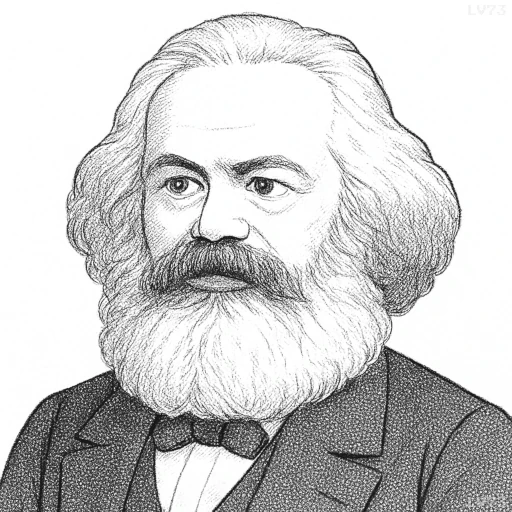“In bourgeois society capital is independent and has individuality, while the living person is dependent and has no individuality.”

- May 5, 1818 – March 14, 1883
- Born in the Kingdom of Prussia (Germany)
- Philosopher, economist, political thinker
table of contents
Quote
“In bourgeois society capital is independent and has individuality, while the living person is dependent and has no individuality.”
Explanation
In this quote, Marx highlights the alienating effects of capitalism on human beings. He argues that in a capitalist society, capital—which refers to wealth in the form of money, property, or resources—is treated as an independent force that operates according to its own laws and interests. It becomes autonomous, gaining “individuality” because it is capable of generating more capital through investment, production, and exchange. In contrast, the living person, the worker who creates value through their labor, is portrayed as dependent on capital to survive, because they must sell their labor in exchange for wages. The worker’s individuality is submerged in the system, as they are treated as a commodity, defined by the work they perform rather than their human essence or unique qualities.
Historically, Marx’s critique of capitalism centers on the idea that human beings in a capitalist system are alienated from the products of their labor, their own creative potential, and their social relations. In a capitalist society, workers are forced to sell their labor to survive, and in doing so, they become dependent on capitalists (those who own the means of production) for their livelihood. The capitalists, by contrast, hold the power to accumulate wealth and increase capital without having to engage in productive labor themselves. This dynamic, according to Marx, reduces workers to mere instruments of production, stripping them of their individuality and agency in favor of capital accumulation.
In modern contexts, this critique remains relevant when examining the dynamics of economic inequality and labor exploitation. In many capitalist economies, wealth and power are concentrated in the hands of a small elite—corporations, investors, or the 1%—who control vast amounts of capital. Meanwhile, the majority of people, who contribute through their labor, remain dependent on wages and are often marginalized in terms of economic decision-making or social mobility. Marx’s quote serves as a powerful reminder of how capitalism elevates capital as an independent, autonomous force, while reducing human beings to mere tools in the system, dependent on their labor to survive, and often alienated from their true potential and individuality.
Would you like to share your impressions or related stories about this quote in the comments section?

